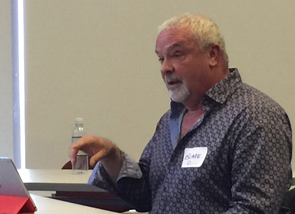 Dawn Mulcahy shared thoughts on how tech affects talk.
Dawn Mulcahy shared thoughts on how tech affects talk. Communications convergence is here. Are you ready? Do you have a strategy? Find out what this group of experts in writing, editing, publishing, education and digital media had to say at Communication Convergence 2015 in Vancouver recently.
Communications Convergence 2015 Vancouver, organized by Cheryl Stephens and Katherine McManus, looked at how new media is changing how we communicate with and relate to our audiences.
Writers, editors, educators, publishers, authors, digital media experts joined forces to examine: Coping with the New: from distribution channels to audience expectations. Many questions were asked. A few conclusions were drawn.
How technology affects how we use language?
Public Relations professional Fawn Mulcahy lifted the lid by saying LOL (laugh out loud) that technology doesn't affect language. We are communicating with clients in new ways, often due to technology. But, we need to build these words, technology and social media into our client communication strategies. What now? We need to go back to the drawing board and create new paradigms.
How does the new reality affect communication teams?
Panelists Paula Ayer, writer-editor, Frances Peck, communication consultant and writer, and Roberta Rich, author explored how their fields are changing. The consensus – publishers want more, better, faster. 'Much like our audiences. Creative teams need to work more efficiently and effectively than ever.
Who is today's audience?
Cheryl Stephens, clear communication consultant, delved into The Hidden Intricacy of the Modern Reading Audience. Forget your concept of the client as a person, much like you, using simple demographics. We need to think about culture, language, health, literacy, stress, social situation and more. The 'general public' is not amorphous. Again, participants agreed we need to 'invest more' in getting to know our audiences, and at the early stages of the strategic planning.
Are Audience Expectations Changing Now That All Communications Is a Conversation?
I, with my clear communication consultant and trainer hats on, lead the whole group discussion looking at the change in audience expectations driven by the prevailing mode of communication – the conversation. The fusion of fictional and factual story telling is not new. What is new is that our messages are no longer linear. They are circular. We are all interacting and being interactive. We are listening and responding.
Participants suggested audiences, publishers and writers want communications to be:
- Directive
- Immediacy
- Transparency
- Accountable
- More democratic.
We are all publishers now
Blake Desaulniers, writer, photographer, videographer and content marketer, issued this challenge: 'get with the digital, social, new media world we live in' and make it work. The Internet has made everyone a publisher, from social media messages, to blogs.
If you are not doing keyword research, don't publish. SEO, keywords, digital media stats are now the threads that make or break our communication strategies. 'Engagement' and 'measurement' will determine the winners in today's complex and challenging marketplace.
His advice about developing a complex marketing persona, exploiting social media delivering higher quality engagement and integrating new metrics was thought-provoking.
Today we are looking at the new. Coping with creating effective strategies for our next move. And, our audience relationships couldn't be more competitive, challenging and complex. But, the answers are in taking the time to build personas, track behaviours and build messages that tell stories our readers are keen on. At your next meeting ask 'Who is our audience?' and see if your members are in tune with today's clients.


 RSS Feed
RSS Feed
